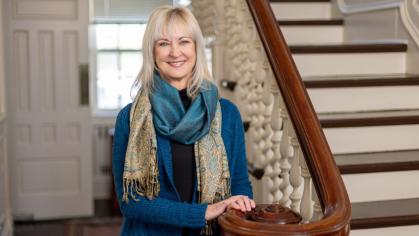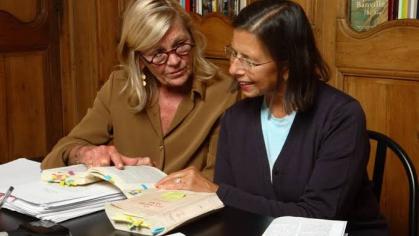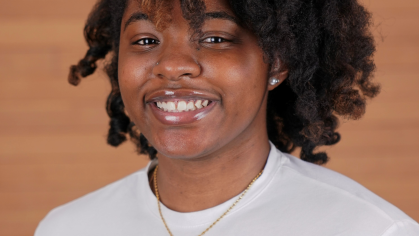Alumna Spotlight – Dr. Kaitlin Gold DRC'14
Since graduating Douglass, Dr. Kaitlin (Katie) Gold DRC’14 has made monumental strides in the field of plant pathology—first as a graduate student at the University of Wisconsin-Madison and postdoctoral scholar at NASA Jet Propulsion Laboratory, and currently as an Assistant Professor of Grape Pathology at Cornell University. While her main focus is early plant disease detection with remote sensing, the agricultural breakthroughs in her work emanate outwards, affecting human health and global well-being.
“From famine to environmental and financial impacts, the health of our crops affects everything,” said Dr. Gold. “If you like to eat, you should care about plant diseases.”
While a Douglass student, Dr. Gold double majored in plant and agricultural science in the School of Environmental and Biological Sciences (SEBS). A student in the SEBS Honors Program and a George H. Cook scholar, Dr. Gold began her research career as a sophomore while working with Dr. Thomas Molnar’s hazelnut breeding program. She received a research grant from Douglass to support her G.H. Cook senior thesis with Dr. Molnar, inspiring an enduring interest in plant diseases.
“I knew I wanted to do something related to pathology early on,” said Dr. Gold. “And while I had always been interested in human pathology, I just didn’t like blood. Through taking plant biology courses and my undergraduate research, I began to find plant pathology fascinating.”
At her lab at Cornell University, Dr. Gold continues her work by studying the fundamental and applied science of plant disease sensing. Her research group uses proximal and remote sensing to improve grape and specialty crop disease management by locating sick plants before human scouts can find them so they can be treated or removed from the rest of the crop.
“It’s incredibly difficult to cure a plant. We really have to focus on prevention. If a plant does get infected, then we have to focus on mitigation as quickly as possible,” said Dr. Gold. “To do this work, we have to ask ourselves why plants look sick to our sensors in the first place, how this impacts our ability to find them, and how the technologies we use can be applied in the real world to help grape growers make better and earlier intervention choices.”
One of the primary goals of Dr. Gold’s work is to develop more sustainable agricultural practices.
“Like Rutgers, Cornell is a Land Grant Institution—the research we do must benefit our society,” she said. “In regards to my own work, I feel it’s very meaningful to change our agricultural practices to sustain the people we have on the planet. If growers could know exactly where and when disease is threatening their crops, they could apply pesticides or remediation activities more selectively, improving agricultural sustainability. Pathogens eat away 200 billion dollars of crops, which translates to 15-30 percent of the global harvest, each year. That’s a lot of food to lose. We haven’t been leveraging remote sensing nearly enough to prevent these losses. One of the goals of my research program is to build a satellite-based disease surveillance system for plant disease to help prevent these losses on a global scale.”
In addition to her research, Dr. Gold holds the primary extension responsibility for grape disease management in New York state, and works with NY grape growers, helping them learn and enact the best practices for mitigating disease with currently available tools, and how remote sensing can improve these practices.
“Bringing research to the people who grow grapes, and in turn advocating for them, is a really important part of my job,” said Dr. Gold. “I love working with the wine and grape industry in NY and the broader United States. I have amazing colleagues and the growers themselves are just delightful.”
In addition to furthering her scientific career, Douglass provided Dr. Gold with deep connections that have lasted for years.
“My best Douglass memories are of the friends I made while living in Bunting Cobb Living-Learning Community for Women in STEM. They were such a wonderful and driven cohort of women,” she said. “I feel bad for the incoming class of students who don’t get to have this experience, but I also know the Douglass community is composed of compassionate and powerful role models they can lean on to make it through this difficult time.”
To students interested in environmental and agricultural careers, Dr. Gold recommends they prioritize research.
“Getting involved in research is my number one piece of advice,” she said. “My life was changed by the undergraduate research that I did while at Douglass—you can do that too. Be fearless and relentless in pursuit of your goals. If you want it, you can get it.”


